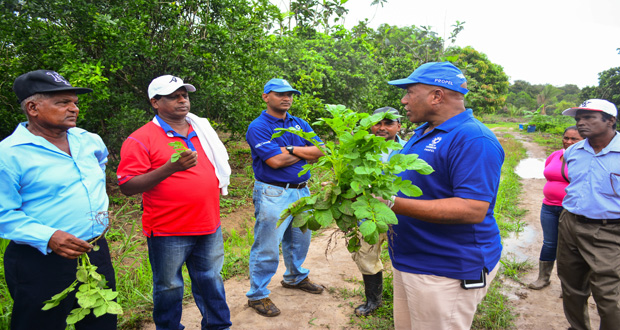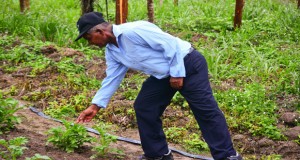
Irish potato farm under cultivation at Laluni – Multi-million-dollar industry in the making
By Narendra Seoraj
A LALUNI farmer could reap some 17,000 pounds of Irish potatoes in two months’ time, springing hope that other similar farms could bear produce and help cut the country’s huge food import bill.Farmer Lloyd Doobay and his son Ravi decided to take the bold step in Irish potato cultivation after receiving training from the World University Service of Canada (WUSC), a Canadian non-profit organization in international development.
Through a programme called the Promotion of Regional Opportunities for Produce through Enterprises and Linkages (PROPEL), the organization gave farmers an opportunity to explore potato farming, which could develop into a multi-million-dollar industry here.
Early last month, WUSC Guyana convened a two-day training session on the agronomy of potato. This activity took the form of a farmer field school and an indoor classroom session, which was carried out ahead of the “potato pilot” projects.
The programme was held under the stewardship of WUSC’s Regional Senior Agricultural Coordinator Alvin Murray, Agronomist Joanna Robertson, and two Agricultural Extension Facilitators — Mahendra Singh and Leslie Lewis.
Subsequently, eight farmers from Regions Two, Four and Ten were selected to cultivate potato based on their willingness and ability to establish trial plots on their farms.
“PROPEL is collaborating with research scientists and extension officers from the National Agricultural Research & Extension Institute (NAREI) to support research documentation of the pilot and extension services to the potato farmers,” said Murray during his explanation to potential potato farmers who were involved in a follow-up farmer field school at Laluni.
The PROPEL team made a visit to the Laluni (Linden/Soesdyke) site where Doobay has his potato farm.
Murray carefully examined the six different varieties of potato which have been planted in the plot of land.
He said potatoes need the correct temperature, moisture and sunlight for them to grow. And so far, given the appearance of the current crop, the necessary conditions were seen to exist, given that the leaves of the plants are green and some plants have already started to bud flowers.
“Once a potato plant sprouts flowers, it means that (potatoes) have started to form at the bottom; and once taken care of within the next eight weeks, you will have fully grown potatoes,” said the Coordinator, as he expressed his excitement at the high success rate of the cultivation of potatoes here.
These crops, he said, have only been planted for four weeks now, and have already grown well; which goes to show that, once properly taken care of and planted in the right areas, Guyana will have another multi-million-dollar agricultural produce.
Doobay and his son were commended for their good work on the plot, because they were among the set of farmers who showed such a high success rate with their lush crop.
The others were unable to make similar progress because of the current weather condition which Guyana is experiencing.
Doobay, however, innovatively drilled a well next to his plot, and is able to access enough water to supply his crops. And as explained by Murray, based on the crop’s current appearance, the Doobays will be able to harvest approximately 17,000 pounds of potatoes.
Therefore, re-introducing potato cultivation will reduce Guyana’s import bill, given that on a yearly basis Guyana’s potato intake is approximately six million kilogrammes (about 13.2 million pounds).
WUSC is helping smallholder Caribbean farmers facilitate the safe, effective and efficient movement of fresh produce from their farms to high-value markets.
With a particular focus on women and youth, the organization is supporting up to 11,500 small-to- medium-scale producers and up to 45,000 indirect beneficiaries, including processors, related businesses, and family members across eight countries in the Caribbean.

